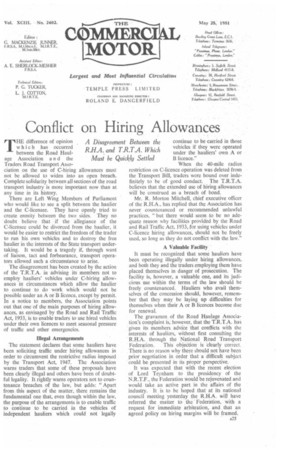Conflict on Hiring Allowances
Page 27

If you've noticed an error in this article please click here to report it so we can fix it.
THE difference of opinion which has occurred between the Road Haulage Association a n d the Traders Road Transport Association on the use of C-hiring allowances must not be allowed to widen into an open breach. Complete solidarity between all sections of the road transport industry is more important now than at any time in its history.
There are Left Wing Members of Parliament who would like to see a split between the haulier and the C-licensee. They have openly tried to create enmity between the two sides. They no doubt believe that if the allegiance of the C-licensee could be divorced from the haulier, it would be easier to restrict the freedom of the trader to run his own vehicles and to destroy the free haulier in the interests of the State transport undertaking. It would be a tragedy if, through want of liaison, tact and forbearance, transport operators allowed such a circumstance to arise.
The disagreement has been created by the action of the T.R.T.A. in advising its members not to employ hauliers' vehicles under C-hiring allowances in circumstances which allow the haulier to continue to do work which would not be possible under an A or B licence, except by permit. In a notice to members, the Association points out that one of the main purposes of hiring allowances, as envisaged by the Road and Rail Traffic Act, 1933, is to enable traders to use hired vehicles under their own licences to meet seasonal pressure of traffic and other emergencies.
Illegal Arrangements The statement declares that some hauliers have been soliciting traffic under hiring allowances in order to circumvent the restrictive radius imposed by the Transport Act, 1947. The Association warns traders that some of these proposals have been clearly illegal and others have been of doubtful legality. It rightly warns operators not to countenance breaches of the law, but adds: "Apart from this aspect of the matter, there remains the fundamental one that, even though within the law, the purpose of the arrangements is to enable traffic to continue to be carried in the vehicles of independent hauliers which could not legally continue to be carried in those vehicles if they were operated under the hauliers' own A or B licence."
When the 40-mile radius restriction on C-licence operation was deleted from the Transport Bill, traders were bound over indefinitely to be of good conduct. The T.R.T.A. believes that the extended use of hiring allowances will be construed as a breach of bond.
Mr. R. Morton Mitchell, chief executive officer of the R.H.A., has replied that the Association has never countenanced or recommended unlawful practices, "but there would seem to be no adequate reason why facilities provided by the Road and Rail Traffic Act, 1933, for using vehicles under C-licence hiring allowances, should not be freely used, so long as they do not conflict with the law."
A Valuable Facility It must be recognized that some hauliers have been operating illegally under hiring allowances, and both they and the traders employing them have placed themselves in danger of prosecution. The facility is, however, a valuable one, and its judicious use within the terms of the law should be freely countenanced. Hauliers who avail themselves of the concession should, however, remember that they may be laying up difficulties for themselves when their A or B licences become due for renewal.
The gravamen of the Road Haulage Association's complaint is, however, that the T.R.T.A. has • given its members advice that conflicts with the interests of hauliers, without first consulting the R.R.A. through the National Road Transport Federation. This objection is clearly correct. There is no reason why there should not have been prior negotiation in Order that a difficult subject • could be presented in its proper perspective. It was expected that with the recent election of Lord Teynhain to the presidency of the N.R.T.F., the Federation would be rejuvenated and would take an active part in the affairs of the industry. It is to be hoped that at its national council meeting yesterday the R.H.A. will have referred the matter to the Federation, with a request for immediate arbitration, and that an agreed policy on hiring margins will be framed.




















































































